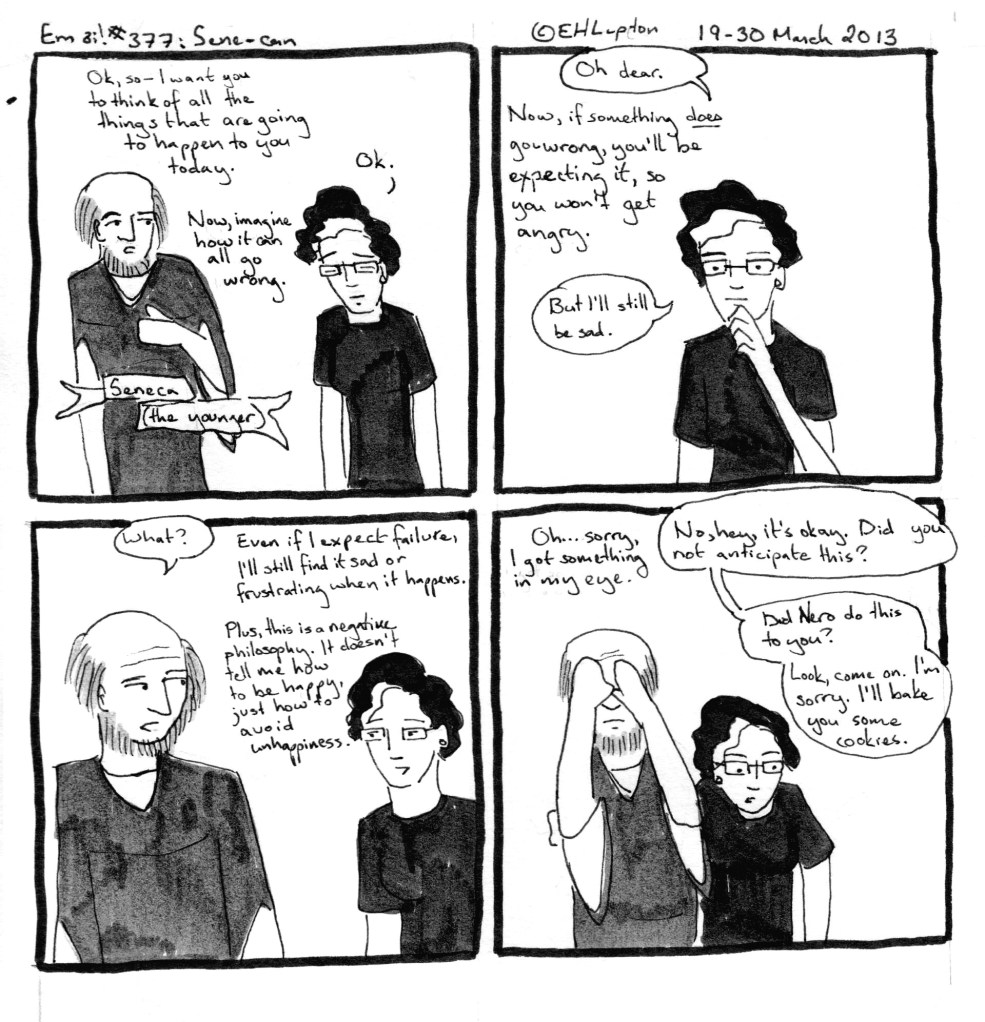So I came across Seneca (founder of the Stoics) the other day and immediately realized I was dealing with a kindred spirit. Seneca actually did advocate spending some time every day meditating on what could potentially go wrong in your life, because then if it did go wrong, you’d be psychologically prepared for it. Alain de Botton implies that this philosophy grew out of the fact that Seneca lived among the Roman elites, who were a fairly angry and unstable group from the emperor on down. And I actually do this quite a lot, though I refer to it as “reining in my expectations.” For example, if I had a job interview that went really well, I tell myself that they are not only not going to give me the job, but they will probably come and burn down my house for wasting their time. Then if they actually give me the job (please give me the job–you know who you are), I am surprised and happy, and if they reject me, I am less sad.
Anyway, despite all that, I couldn’t resist making fun of him a little. It could be worse, I guess–Schopenhauer advised his readers to swallow a toad every morning, so that would be the worst thing that happened to them all day…
We’ll file this under B618.L86 2013, for Philosophy (General)—Ancient (600 B.C.-430 A.D.)—Occident—Greco-Roman philosophy—Individual philosophers—Seneca, Lucius Annaeus, ca. 4 B.C.-65 A.D.—Biography and memoirs. Criticism and interpretation—General Works.
I should point out that in the time between when I drew this and when I inked it, my hair streak was dyed over (so I could look respectable for job interviews). You can check it out in the below photo, in which I failed to do it and maybe I didn’t even brush it this morning? And also I look a little cranky. (Hah. Take that, Cameron Russell?)

There have been so many good, philosophical articles in the news lately, from the issues of justice and punishment versus rehabilitation raised by the conviction and sentencing of Malik Richmond and Trent Mays, to the question of deciding when someone becomes a person raised by the North Dakota Personhood amendment to all sorts of interesting problems raised by SCOTUS hearing arguments on Proposition 8 and DOMA. But then Bryan posed me a fascinating problem about epistemology and free will, so I’m going to write about that. Actually, I’m going to write down the problem as posed to me now, and then next week I’m going to write about my thoughts on the issue.
Here we go: Bryan doesn’t believe in free will. His proof for this goes thusly:
- Bryan is a materialist, which means he believes that there is no mind/brain dichotomy–the mind is just our perception of the workings of the brain. The brain is controlled by various chemicals.
- Because the brain is made up of particles, if we really understood the brain (and quantum physics), we could build a computer that could predict what someone is thinking.
- So now that we know what someone is thinking, given a set of initial conditions, we can predict someone’s behavior.
- Since all choices can be accurately predicted, there is no free will. We are essentially controlled by chemicals. Free will is just an illusion we have because we ourselves don’t entirely understand the workings of our brains. But we might as well live with this illusion, because we can’t build a computer that can predict things like that.
(Bryan, you will have to let me know if I have misconstrued your argument.)
So I have been reading and thinking about quantum physics, Gödel’s incompleteness theorem, Newcomb’s problem and meta-Newcomb’s problem (even rereading my senior philosophy thesis), and also looking into the works of a lot of theorists from about 1950-present. It has been quite a knotty problem, I will tell you. If you have any comments on it, please feel free to post them in the comments section here, on FB or G+, or email them to me at ehlupton(at)gmail(dot)com. I will try to address any worthwhile opinions I receive.


Given that Bryan is correct—and I believe that he is—we should not only be able to predict what a person is thinking, but we should be able to predict what any given person is thinking. With a quantum computer and all the relevant input, we should be able to calculate what Einstein would have thought about a given set of initial conditions. The irony here is that Einstein did not believe in a quantum universe and that limited his ability to achieve his goal of discovering the unified theory. General relativity works on the cosmic scale and quantum mechanics works on the sub-atomic scale, but both are incompatible with each other. “God does not play dice with the universe,” he said. But if we had a complete model of the brain’s function—his brain’s function—and the quantum computer sufficiently powerful to process the algorithms, we should be able to ‘tweak’ the model to accept quantum mechanics and predict the new direction of Einsteinian theorization, had he been able to accept it. In doing so, we will have created a “unified Einstein” within the computer.
This all begs the question: would this capability be sufficient to allow us to claim that we have created a sentient being? Having done so, would that computer model behave as though it had a mind and free will?
We might, in the future, be able to build a quantum computer capable of running the algorithms. A computer of that power would be necessary to determine the variables necessary to make accurate predictions. In the end, however, we must realize that the set of algorithms to which we aspire are only a mathematical model, and as stated by Richard Levins at SUNY Stony Brook, any predictive model can only give you a choice of two of the three qualities: generality, precision, and realism, but not all three. The special case where one can have all three is where you know all the independent variables and all the relevant values. “Tell me everything and I can tell you anything,” as Nelson G. Hairston of the University of North Carolina was fond of saying.
There is a short story in here somewhere. I believe that Asimov has already written the novel.
Is that the Asimov one where they use a computer to write down all of the names of G-d and the stars start to go out?
I am really intrigued by the idea of a computer simulation of Einstein. However, to the extent that you might get it to accept quantum mechanics, I would be suspicious that the simulation is inaccurate. All the empirical evidence concerning Einstein’s thought is that he didn’t believe in quantum mechanics. In order to be considered a model of Einstein, the computer simulation will have to behave in accord with what we know about his behavior. I don’t think “he”can change his mind posthumously. That would give the computer a degree of freedom greater than the original model (the “real” Einstein), which should not be possible. The computer is necessarily more limited than the human brains which constructed it (which are probably more limited than Einstein’s brain). Alas, somebody other than Einstein is going to have to complete the Grand Theory of Everything.
And yes, I think there is a neat little detective story in here, in which the detection of some sort of fraud turns on just this sort of point. Maybe there are other plots in this paradox also.